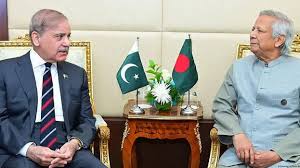Friends and foes: On Bangladesh-Pakistan ties.
Pakistan is filling the void created by the alienation of India from Bangladesh.
In the first such visit in 13 years, Pakistan’s Foreign Minister Ishaq Dar travelled to Dhaka over the weekend to meet with members of the Bangladeshi interim government, headed by Muhammad Yunus, and hold talks with his counterpart, Touhid Hossain. Ties had been tense since 2009, when Sheikh Hasina came to power, and under strain over the prosecution of those who colluded with Pakistan during the 1971 liberation war — and the assassination of her father Sheikh Mujibur Rahman and most of her family in 1975. In 2015, Bangladesh demanded the expulsion of a Pakistani diplomat over links to a terror group and recalled its High Commissioner to Islamabad after Pakistan protested the hanging in Bangladesh of those found guilty of collusion in 1971. Although the two nations subsequently restored envoys, they began to repair ties after Ms. Hasina’s ouster last August. The process was also nudged by China, which convened a trilateral mechanism with Bangladesh and Pakistani officials in Kunming. In Dhaka, there was agreement to restore visa facilitation for diplomats, have direct flights, grant scholarships for Bangladeshi students and ways to enhance trade from current lows of less than a billion dollars. However, the Yunus government has refused to move on decades-old Bangladeshi demands for reparations from Pakistan. These include a formal apology for the genocide in 1971 perpetrated by Pakistani forces, financial compensations and the repatriation of thousands of “Stranded Pakistanis” or Urdu-speaking Muhajirs who had migrated there after Partition and still held allegiance to West Pakistan. While meeting Mr. Dar, Mr. Yunus also called for strengthening regional cooperation, including a revival of the SAARC process. India has eyed the thaw in Islamabad-Dhaka ties with some suspicion, given reports that Pakistani diplomats supported Jamaat-e-Islaami student activists during the anti-Hasina protests last year. Of greater concern has been military and intelligence contacts.
While there is no question that New Delhi has cause to feel cut out and bruised by the new-found bonhomie between an erstwhile ally and a long-time foe, it is time that South Block adopts a more realistic prism. Pakistan is stepping into the breach caused by the strain in India-Bangladesh ties. Although Mr. Modi met Mr. Yunus in April and External Affairs Minister S. Jaishankar met Mr. Hossain on the side-lines of other international events, neither has contemplated a visit, nor has Mr. Yunus been invited. With the announcement of elections in Bangladesh, in February, New Delhi must also broaden its political engagement with political parties there, even as it nudges the Yunus government to a more inclusive process. In the absence of a stronger regional South Asian grouping, New Delhi has a difficult task in holding sway over bilateral ties between any of its neighbours, especially Bangladesh and Pakistan.
